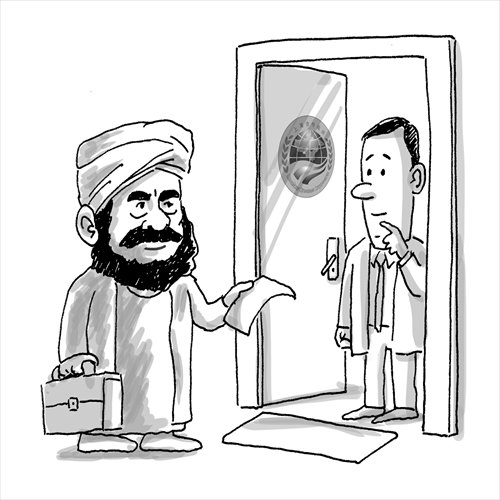Iran needs to solve problems with West before taking full place in SCO

Illustration: Liu Rui/GT
Iranian President Hassan Rouhani said earlier this month that Iran is eyeing full membership in the Shanghai Cooperation Organization (SCO). Compared with the first application in March 2008, Rouhani's statement seems more formal and sincere this time, and carries greater weight.
The SCO's vitality and influence is attracting Iran to join. At the beginning, the organization discussed only security cooperation in the regional politics. But now, it has expanded into a comprehensive organization that focuses on politics, economy and security. It is now an organization with a multi-track system that involves formal members, observers and partner states. And its expansion and applications for membership from a growing number of countries highlight the organization's vigor and increasing influence.
Iran has always attached great importance to Central Asia. But as a country that labors under many diplomatic restrictions, joining a regional organization is one of its options to get involved in global affairs and seek development.
When India and Pakistan were accepted as full members of the SCO in July, 2015, Iran, also as an observer, was motivated to seek membership. This is the direct driving force for Rouhani's declaration.
The final deal over Iran's nuclear program also makes the country more confident to officially join the bloc. Previously, the SCO has some concerns on fully taking Iran in, such as worrying about whether Tehran will turn the organization into a "battlefield" against the West, or trigger unnecessary suspicions from the West toward the SCO itself. Yet the nuclear deal signed in July this year has removed some of the obstacles between Iran and the Western countries.
Moreover, applying for a full membership in the SCO is a major part of Rouhani's diplomatic reforms. Since assuming office in 2013, Rouhani has been trying to alter the sharp confrontation between Tehran and the international community and the damage to Iran's image done by his predecessor Mahmoud Ahmadinejad, while searching for reconciliation with the international community.
After achieving a major diplomatic breakthrough with the West, applying for a formal membership in the SCO can be considered as the next focal point of the country's diplomacy.
But whether Iran will be fully accepted by the SCO depends on whether it can avoid becoming a difficulty for the organization. The relationship between Iran and the group is far from Rouhani's simple description that it is a win-win result for the SCO to accept Iran as a full-fledged member. There is no problem in this bilateral relationship, but the real problem is Iran's difficulties with the West. If Iran joins the SCO without resolving these troubles, it will bring the problems to the SCO.
It is impossible for Iran to solve all its contradictions with the West overnight. The nuclear deal is a major turning point, but it does not imply total closure. Given that the nuclear issue is related to complicated factors including geopolitics, international security, political games and technical standard, the future implementation of the deal is filled with uncertainties.
In addition, Iran supports radical organizations such as Hezbollah, as well as Syria's Assad regime, and the country's own democracy issue and its influence in Iraq are all the focal points of controversy between itself and the Western nations. These issues can't all be settled at once.
Iran's domestic political games also play a role in whether the nation can join the SCO. In the power system that centers on Iran's Supreme Leader Ayatollah Sayyid Ali Khamenei, apart from moderate conservatives represented by Rouhani, there are also hardliners, traditional conservatives, extreme religious conservatives and others. They are watching closely Rouhani's diplomatic movements, and there will be oppositions or impediments from other factions.
Iran should use its diplomatic sincerity to seek goodwill from the international society. After the Islamic revolution, Iran interacted with the world in a vicious circle of tit-for-tat. It needs to make some changes, since status as a major power can be earned by responsible and practical actions.
The author is an associate professor of the Institute of International Relations at Shanghai Academy of Social Sciences. zhjm@sass.org.cn